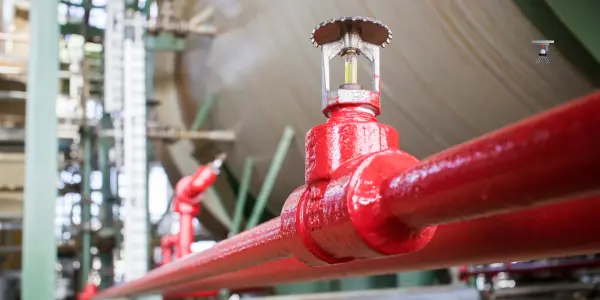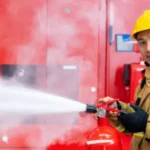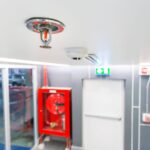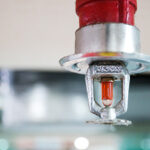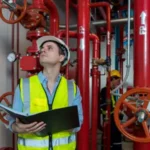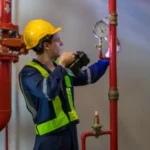Fire protection is undoubtedly the most significant aspect that should be considered by any building, be it a comfortable home, an active office space, or a huge industrial facility. Every single year, countless fire events lead to injuries as well as crippling economic loss.
Do you know that buildings without sprinklers suffer property damage 3 times greater than that of buildings with sprinkler systems, as determined by the National Fire Protection Association (NFPA)?
Installing a fire sprinkler system is more than a legal requirement; it’s a proactive strategy to protect lives, property, and long-term investments. Sprinklers act immediately when heat is detected, controlling flames and smoke before fires can spread. They work seamlessly with alarms and other safety equipment to ensure a building is prepared for emergencies.
If you’ve ever wondered whether sprinklers are really worth the investment or how they benefit a building beyond compliance, you’re in the right place. Let’s explore the top 10 benefits of installing fire sprinkler systems and see why they are a game-changer for fire safety.
Enhanced Life Safety
The main function of a fire suppression system is to safeguard lives. Sprinklers react automatically to heat, suppressing flames and smoke before they become out of control. This quick response is particularly important in high-rise buildings or rooms where there are a lot of people.
The best thing is:
- Decreases risk of injuries and fatalities
- Facilitates safe evacuation for every occupant of the building
- Functions in harmony with fire alarms and emergency lighting
Reduces Property Damage
Fires can destroy structures and its stuff in minutes. Sprinklers move swiftly, containing fire to its origin and averting massive structural damage. Early suppression frequently saves repair costs many times greater than it would be without a system.
The best part, it:
- Safeguards structural components and interiors
- Lessen the loss of furniture, computers, and other valuable assets
- Lessens long-term disruption to business operations
Lower Insurance Costs
Sprinklered buildings are typically eligible for lower insurance premiums. Insurance companies know that sprinklers reduce the risk of fire damage to their buildings, and sprinklers are not only a precautionary measure but an astute financial choice.
These systems:
- Reduces yearly insurance premiums
- Illustrates proactive risk management
- Makes buildings eligible for extra coverage or discounts
Quick Response to Fire Risks
In contrast to depending solely on human response, sprinklers respond instantly when there is heat detection. Such a quick response can suppress small fires before they turn into large fires. Coupled with testing for fire alarms, sprinklers are an overall early detection and suppression system.
It:
- Triggers immediately upon temperature increase
- Suppresses fires before extending to other parts
- Increases the effectiveness of overall safety measures
Regulation Compliance of Fire Safety
Most jurisdictions mandate fire protection systems for business, residential, and industrial structures. The installation of a fire sprinkler system helps to meet building codes and fire safety regulations and minimize potential legal liabilities.
And on the other hand, it:
- Complies with local and national fire codes
- Expresses commitment to the safety of the occupants
- Saves from fines and possible legal repercussions
Safeguards Valuable Equipment and Inventory
For industrial and commercial buildings, equipment and inventory are usually huge investments. A fire can consume these assets within minutes, but sprinklers minimize damage, save operations, and lower financial losses.
These systems:
- Protects machinery, electronics, and inventory
- Decreases business downtime and operational disruptions
- Assists in recovery quicker after fire incidents
Decreases Environmental Impact
Sprinkler systems suppress fires in the early stages, minimizing smoke, ash, and toxic chemicals emitted directly into the environment. Sprinkler systems also conserve water compared to large-scale manual fire suppression efforts, minimizing water damage to structures and environments.
In addition, it:
- Restricts pollutants from unwanted fires
- Conserves water used when suppressing fires
- Saves landscaping and open spaces
Complements Other Fire Safety Devices
Sprinklers work best when complemented by other fire protection devices, like smoke detectors and fire extinguishers. Together, they provide a layered safety strategy that maximizes the level of protection.
Also, it:
- Improves early detection and suppression capabilities
- Augments manual firefighting operations
- Enhances overall building safety strategy
Increases Occupant Confidence
A building with an effective fire suppression system reassures tenants, workers, and visitors. Satisfaction increases with improved confidence in fire safety measures, and confidence in building management builds.
What’s more, these systems:
- Boosts the morale of workers and tenants
- Promotes safer workplace or living conditions
- Exemplifies responsible management and initiative
Long-Term Cost Reduction
Although the installation costs are high initially, sprinklers pay for themselves in the long run by conserving property and saving insurance dollars. They also keep minor fires from becoming large catastrophes.
Tips for Maximizing Fire Sprinkler Effectiveness
Let’s know these:
- Perform routine inspection for proper operation of the system
- Leave sprinkler heads clear for effective coverage of all areas
- Use manufacturer-recommended maintenance
- Integrate sprinklers with fire alarms and extinguishers for multiple levels of protection
- Train occupants in emergency evacuation procedures
Wrapping It Up
Installation of a fire sprinkler system is a significant step towards protecting lives, assets, and investments. Paired with fire alarm testing, inspections, and high-quality fire safety equipment, sprinklers create a comprehensive, effective fire protection plan that provides peace of mind and lasting protection.
Frequently Asked Questions
1. How often should a fire sprinkler system be inspected?
Annual inspections by certified technicians are ideal, with some components inspected monthly or quarterly based on local codes.
2. Can sprinklers stop all fire damage?
Although sprinklers greatly minimize fire damage, they are most useful when supported by smoke detectors, alarms, and adequate fire safety measures.
3. Are fire sprinklers universally applicable to all types of buildings?
Yes. Fire sprinkler systems can be installed in residential, commercial, industrial, and historic buildings with systems specifically designed to meet their individual needs.
4. Will the sprinklers go off unnecessarily?
Today’s sprinklers are heat-sensitive, not smoke-sensitive, and only trigger at higher temperatures, so false activations are very unlikely.
